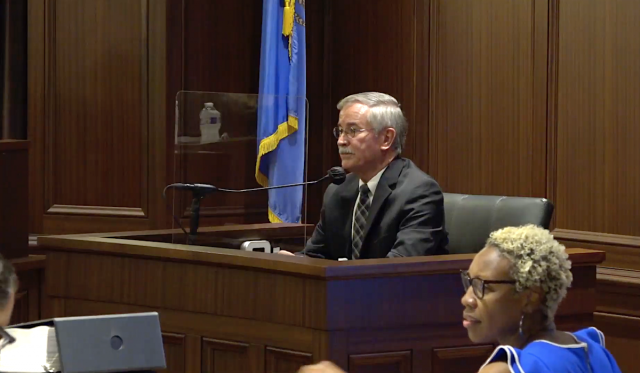
Presiding Oklahoma County District Judge Ray Elliott will not seek re-election and has instead announced his intention to retire early next year.
Elliott sent a letter to the state administrative director of the courts on Tuesday “as my official intent to retire effective February 1, 2022.”
Elliott gave no reason for the decision, although he has been rumored as a potential candidate for Oklahoma County district attorney, which is up for election in 2022. (Tuesday evening, the four declared candidates for the office participated in a forum.)
A 1980 graduate of the Oklahoma City University School of Law, Elliott worked as an assistant district attorney in Oklahoma County until 1998. He became a judge in 1999 and was unchallenged in his 2018 re-election campaign.
A message left for Elliott at his office seeking comment went unreturned before the publication of this story.
Ray Elliott presided over Jerome Ersland trial
A mustachioed attorney with a trademark gravely voice, Elliott attended Southwestern Oklahoma State University in Weatherford, earning a bachelor’s degree in 1974 and a master’s in 1975.
Since Elliott became a district judge in 1999, he has presided over a number of high-profile cases, including that of Oklahoma City pharmacist Jerome Ersland, who was convicted in the shooting death of 16-year-old Antwun Parker during a robbery attempt in 2011.
In October, Elliott recused himself from considering the application for a citizen-called grand jury to investigate District Attorney David Prater. Despite his eventual recusal, the applicants criticized him for not immediately acting on the application before the statutory deadline. Elliott said no attorney had notified his office about the filing, which was later amended and approved by District Court Judge Richard Ogden.
Elliott’s wife, Sandra, also worked in the Oklahoma County District Attorney’s Office as a prosecutor. She was involved in the 1999 prosecution of Julius Jones, who was convicted of murdering Edmond resident Paul Howell and sentenced to death. Gov. Kevin Stitt recently commuted Jones’ sentence to life in prison without the possibility of parole.
Turnover in district court
Elliott has also seen controversy swirl inside his own courthouse over the past year, particularly with a pair of judges leaving the bench amid controversy.
Judge Kendra Coleman was removed from office in September 2020 after a judiciary panel found that she committed “oppression in office” and that she violated multiple rules of conduct governing state court judges. Elliott testified in that case.
Coleman has posted a photo on her Facebook page announcing that she is running for a district court judge position again in 2022, despite a lawsuit recently filed against her by the Oklahoma Ethics Commission. Coleman’s profile photo proclaims, “Come get your judge back!”
Coleman’s Facebook announcement of her candidacy drew attention to Title 20, Section 92i of Oklahoma state statutes, which would seem to prohibit her from running for election.
“No one who has been removed from judicial office or who has resigned from office pending disciplinary proceedings shall qualify to file as a candidate for judicial office,” the statute reads.
But the final paragraph of the Court on the Judiciary trial panel’s ruling specified that she was removed “without disqualification to hold any future judicial office in the state of Oklahoma.”
Meanwhile, Oklahoma County attorneys are waiting to hear updates on the criminal investigation into former District Judge Tim Henderson, who was suspended and later resigned following allegations that he engaged in sexual assault and misconduct against female prosecutors, defense attorneys and potentially other women.
Elliott said at the time he doubted Henderson’s conduct directly impacted cases he presided over, despite concerns from defense attorneys who have said they believe at least one of his interactions with assistant district attorneys was consensual.
“I have seen nothing to cause me to fear that anyone has anything to worry about,” Elliott said. “It’s my understanding that the allegations have nothing to do with the content of any specific case, and because of that no one should have concerns [or] a lack of confidence in the system.”
But defendants convicted in Henderson’s courtroom are now beginning to appeal their convictions.
Robert Hashagen, who was convicted of first-degree murder in Henderson’s courtroom, has appealed based on an allegation that the prosecuting assistant district attorney was engaged in a romantic relationship with the judge. In pleadings and other documentation, the assistant district attorney says it was not a consensual relationship, while Henderson says that it was.
The Oklahoma Court of Criminal Appeals remanded Hashagen’s appeal to the district court. Elliott recused the entire Oklahoma County judiciary, so an evidentiary hearing was held before Canadian County District Judge Paul Hesse. At this time, the result of the evidentiary hearing is unclear, and the jurisdiction is back before the appellate court with the matter still pending.
Grady County District Attorney Jason Hicks has been assigned by Attorney General John O’Connor to review the criminal inquiry into Henderson’s actions.
(Update: This article was updated at 4:22 p.m. Thursday, Dec. 2, to include additional information. It was updated again at 11:50 a.m., Friday, Dec. 3, to reference the Court on the Judiciary’s specification about Coleman’s future eligibility for holding office.)





















